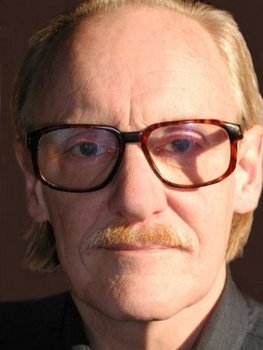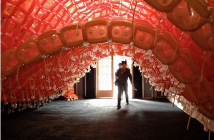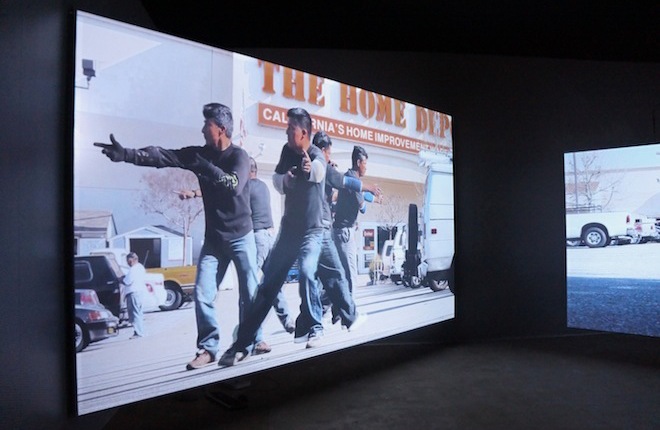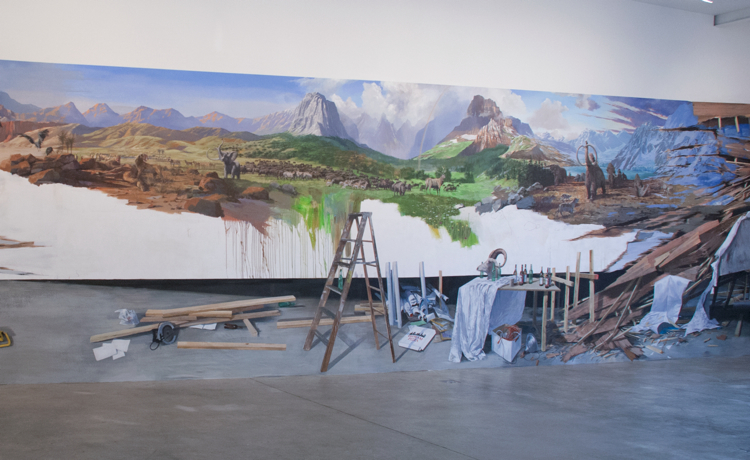By KAREN SCHIFF
"Art is never a commodity," declared Peter Schjeldahl, at Boston University on October 4, "though it can be treated as if it is one." Schjeldahl, the senior art critic at The New Yorker, was trying to reassure a questioner who was concerned about the influence of money in the art world. His first responses to the question (he's all for it! money motivates artists to produce, and then it lets them earn a living!), combined with his further, more thoughtful reflection, represent the evening's tone: chatty yet erudite. Schjeldahl spent over an hour on the stage, talking as he sat or walked around (with no slide show), but I left the auditorium feeling perturbed. Finally, I put my finger on it: A lecture is never a commodity, either...though its audience -- or its speaker -- can treat it as if it is one.
Yes, I went to this event (the latest in an excellent new lecture series -- more info and upcoming speakers at the end of this article) to check out a living legend. Peter Schjeldahl's commentaries on contemporary art -- strong and contextually informed opinions, made lively and readable by giving his precisely chosen words a conversational flair -- have earned him a fine reputation in the tradition of twentieth-century art criticism. Did attending the event because of his reputation, or considering him as an "experience," transform his lecture into a commodity? No; it simply raised my hopes. I went -- as I go to any lecture -- for a glimpse into the speaker's way with things. (Think of the legend of how a young man travelled, for many miles and many days, just to watch a famous rabbi tie his shoes.) Of course, I also wanted to hear something interesting. Because of the quality of Schjeldahl's work, I was extra-eager to find out what he would say. But this does not mean that I commodified him. A lecture can never become a commodity because it cannot be "packaged and sold" as a known quantity. A real encounter with another person -- and the fact of this encounter can never be removed from the lecture -- always leads to something unexpected.
In terms of the unexpected, Schjeldahl delivered: he cracked jokes and gave his audience rich glimpses into his life story and professional proclivities. He was candid about how his career was shaped by his dropping out of college after liking (and doing well in) only one course in seventeenth-century English poetry, which was taught by a professor who had given up on everything except the poetry that was his passion. The legacies of this schooling? An allegiance to carefully wrought phrases in criticism, especially after his early poetry career fizzled. A belief that "Nothing ruins a critic like pretending to care," because disrespecting artwork by not caring about it leads to inner decay as well as a downsliding reputation. And perhaps Schjeldahl's history of bucking the system can also help explain his aversion to being ferried around in fancy limousines, a high-class-art-world ritual which, he confessed, makes him wish he were dead.
So that should give a sense of how this speaker tied his shoes. But what did he say about his main topics? Well, there were no main topics. Schjeldahl didn't come to Boston with something burning to talk about, nor did he create a presentation for us in particular. (This is why I was thinking that maybe he was treating the lecture like a commodity -- it seemed as if BU was, for him, just an easy gig, and not an opportunity.) Instead, he structured the evening as an extended Q&A session. Even his opening remarks -- after he riffed on the oddity of sitting on a lone stool in the middle of a space big enough to hold elephants -- were a sort of Q&A session in print. He read aloud most of the introduction to a forthcoming book of his writings, which was structured as a series of his answers to questions submitted to him by his acquaintances among the cultural elite. He justified this approach by telling us that he thought it would be more lively than a conventional lecture -- especially a slide lecture! -- because those events always put him right to sleep. Besides, the introduction took him four and a half months to write. (Was this supposed to mean that he had no time left to prepare for us?)
The Q&A reading gave way to a Q&A conversation, and here Schjeldahl was very generous with his responses. He often talked for over five minutes in response to a single question, which he then said he had forgotten. (So had many of us.) And his digressions were engaging enough that, on the whole, his approach did not disappoint, especially because some gems glittered amidst the meanderings. On beauty, for instance, he had clearly worked out the details. "I don't believe in the existence of beautiful things," he said, "I believe in the experience of beauty." This position defines beauty as relational -- not inherent to anything. As Schjeldahl continued, "Beauty involves attraction to a thing plus reverence for it -- a desire that it remain forever just as it is." Such an experience of beauty, in his view, is not reserved for a select few; it is human, and almost inevitable. "Beauty is that which gives intense pleasure and great satisfaction to the mind. If we don't find it, it's cause to consider suicide -- only those who are clinically depressed can't see it." Fortunately, Schjeldahl's ideas are open enough to accommodate a wide range of tastes: he lets beauty remain in the eye of the beholder. (Otherwise we might have a lot of aesthetically motivated suicides.)
The lingering provocations of this event attest to the success of lectures at BU – both the Tim Hamill Visiting Artist Lecture Series and the Contemporary Perspectives Lecture Series deserve mention. Lynne Allen, who has been Director of the School of Visual Arts for just over a year, is bringing dynamic speakers to Boston, and her lineup has indeed been stellar. She assembles a fertile mix of artists from diverse backgrounds, media, and stages of their careers, as well as high-profile critics like Peter Schjeldahl and, coming up next month, Robert Storr (in conversation with Chuck Close - it's another Q&A! Come prepared!). See you there, or else maybe at next year's Schjeldahl family July 4th potluck picnic and fireworks fest. We're all invited... if we haven't gotten commodified by then.
More from the BU Speaker Series:
November 1: Painter and photographer Chuck Close (New York) in conversation with Robert Storr, Chair of the Art Department at Yale University and former Curator of Contemporary Art at the Museum of Modern Art, New York (6 p.m., Morse Auditorium, 602 Commonwealth Avenue, Green “B” Train, Blandford Street stop, free and open to the public)
Later this year: Magdalena Campos-Pons (US and Cuba), Ledelle Moe (South Africa), and Jenny Saville (Great Britain)
Image courtesy of the BU's College of Fine Arts by Peter Schjeldahl.




